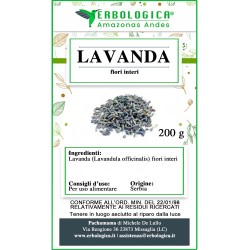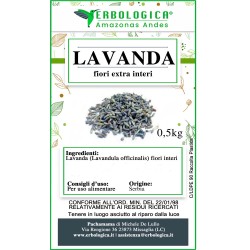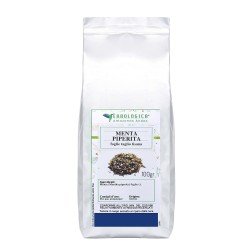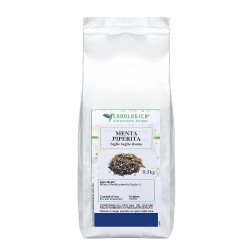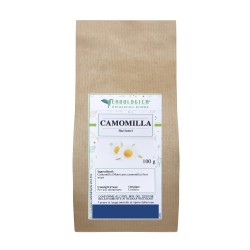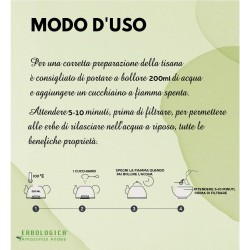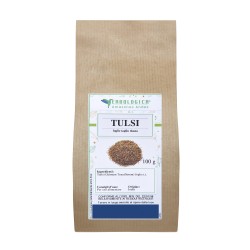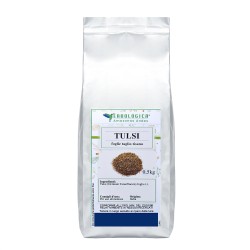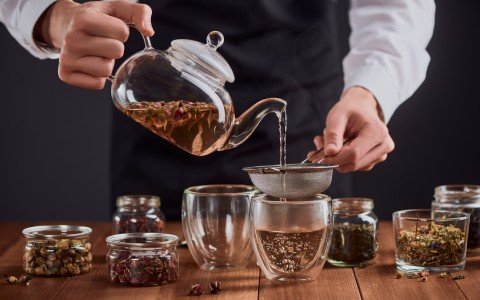
Come preparare correttamente una tisana alle erbe: segreti e consigli
Introduzione alle tisane
Le tisane sono bevande che vengono preparate con erbe aromatiche o piante medicinali, che offrono una vasta gamma di benefici per la salute.
Sono una scelta popolare per coloro che cercano alternative alle bevande caffeinate o per chi desidera rilassarsi con una tazza calda e profumata.
Ma come si prepara correttamente una tisana?
In questo articolo, ti svelerò i segreti e i consigli su come preparare correttamente una tisana in modo da poter godere appieno dei suoi benefici per la salute e del meraviglioso aroma che offre.
I benefici delle tisane
Prima di immergerci nei dettagli della preparazione delle tisane, è importante capire i benefici che possono offrire.
Sono state utilizzate per secoli come rimedi naturali per vari disturbi.
Ogni erba ha le sue proprietà uniche e può offrire benefici specifici per la salute.
Ad esempio, la camomilla è nota per le sue proprietà rilassanti e può aiutare ad alleviare l'insonnia e l'ansia.
La menta piperita, invece, è apprezzata per il suo effetto rinfrescante sul sistema digestivo.
Esistono anche tisane che possono aiutare ad alleviare il mal di testa, migliorare la digestione o rafforzare il sistema immunitario.
Oltre ai benefici per la salute, le tisane offrono anche un'esperienza sensoriale piacevole grazie al loro aroma e sapore delicati.
Diversi tipi di tisane
Prima di addentrarci nella preparazione delle tisane, è importante conoscere i vari tipi di erbe che è possibile utilizzare.
Dalle classiche camomilla e menta piperita alle più esotiche lavanda e salvia, ogni erba ha le sue proprietà uniche.
Ti consiglio di iniziare con le varietà più comuni e di sperimentare man mano.
Potresti scoprire nuovi sapori e benefici per la salute che non conoscevi prima.
Puoi anche creare delle deliziose miscele di erbe, personalizzando così la tua tisana in base ai tuoi gusti e alle tue esigenze.
Come scegliere le erbe giuste per la tisana
La scelta delle erbe è fondamentale per ottenere una tisana di qualità.
È importante acquistare erbe fresche e di buona qualità da fornitori affidabili.
Puoi trovare erbe sfuse in erboristerie specializzate o acquistarle online.
Quando scegli le erbe, assicurati che siano prive di pesticidi o altre sostanze nocive.
Inoltre, tieni presente che alcune erbe possono avere controindicazioni o interazioni con farmaci, quindi consulta sempre un erborista esperto prima di utilizzarle.
Guida passo passo alla preparazione delle tisane
Ora che hai scelto le tue erbe preferite, è il momento di preparare la tua tisana.
Segui questi semplici passaggi per ottenere una tisana perfetta:
Fai bollire l'acqua fresca in una pentola o nella teiera.
È importante utilizzare acqua di qualità perché influenzerà il sapore della tisana.
Evita di utilizzare acqua del rubinetto o già bollita, poiché potrebbe avere un retrogusto sgradevole.
Versa l'acqua appena bollita sulle erbe.
La quantità di erbe dipenderà dalle tue preferenze personali e dalla concentrazione desiderata.
In generale, puoi utilizzare circa un cucchiaino di erbe per tazza di acqua.
Copri la tazza o la teiera e lascia in infusione per il tempo consigliato.
Ogni erba ha un tempo di infusione diverso, quindi consulta le istruzioni specifiche per ottenere i migliori risultati.
In generale, la camomilla e la menta piperita richiedono circa 5-10 minuti di infusione, mentre le erbe più robuste come la salvia o il rosmarino possono richiedere fino a 15 minuti.
Filtra le erbe dalla tisana.
Puoi utilizzare un colino o un filtro per tè per rimuovere le erbe dalla tazza o dalla teiera.
In questo modo, otterrai una tisana limpida e priva di residui.
Aggiungi dolcificanti o altri ingredienti a piacere.
Se desideri dare un tocco in più alla tua tisana, puoi aggiungere un cucchiaino di miele o di zucchero di canna.
Puoi anche sperimentare con l'aggiunta di fette di limone, scorza d'arancia o spezie come la cannella o il cardamomo.
Seguendo questi semplici passaggi, sarai in grado di preparare una tisana perfetta ogni volta.
Tecniche di infusione per diverse erbe
Ogni erba ha un sapore e un aroma unico, quindi è importante conoscere le tecniche di infusione corrette per ottenere il massimo dalle tue erbe preferite.
Ecco alcune linee guida generali:
Erbe delicate come la camomilla e la menta piperita richiedono un tempo di infusione breve, di solito tra i 5 e i 10 minuti.
Se lasci le erbe in infusione per troppo tempo, potrebbero diventare amare.
Erbe più robuste come la salvia, il rosmarino o l'origano richiedono un tempo di infusione più lungo, di solito tra i 10 e i 15 minuti.
Queste erbe possono resistere a temperature più elevate e richiedono più tempo per rilasciare i loro oli essenziali.
Erbe aromatiche come la lavanda o il basilico possono essere leggermente schiacciate prima di essere immerse nell'acqua bollente.
In questo modo, rilasceranno più facilmente i loro oli essenziali, offrendo così un aroma più intenso alla tisana.
Ogni erba ha le sue caratteristiche, quindi sperimenta con diverse tecniche di infusione per trovare quella che funziona meglio per te.
Consigli per esaltare il sapore delle tisane
Se vuoi rendere le tue tisane ancora più gustose, ecco alcuni consigli per esaltare il loro sapore:
Utilizza acqua di qualità: come accennato in precedenza, l'acqua utilizzata influenzerà il sapore della tisana.
Utilizza acqua fresca e di buona qualità per ottenere risultati ottimali.
Sperimenta con le miscele di erbe: non limitarti a una sola erba, ma sperimenta con diverse combinazioni per creare tisane personalizzate.
Puoi mescolare erbe aromatiche con erbe dalle proprietà terapeutiche per ottenere una tisana equilibrata e gustosa.
Regola la quantità di erbe: se desideri una tisana più delicata, utilizza meno erbe.
Al contrario, se vuoi un sapore più intenso, aumenta la quantità di erbe utilizzate.
Aggiungi dolcificanti naturali: se preferisci una tisana leggermente dolce, puoi aggiungere un cucchiaino di miele o di zucchero di canna.
Questi dolcificanti naturali si abbinano bene al sapore delle erbe.
Conservazione delle tisane
Le tisane possono essere conservate per un certo periodo di tempo se conservate correttamente.
È consigliabile conservarle in un luogo fresco, asciutto e lontano dalla luce diretta del sole.
Puoi utilizzare contenitori ermetici o barattoli di vetro per proteggere le erbe dall'umidità e dall'ossidazione.
Tieni presente che le tisane perderanno gradualmente il loro aroma e sapore con il tempo, quindi è meglio consumarle entro un anno dall'acquisto.
Errori comuni da evitare nella preparazione delle tisane
Anche se preparare una tisana può sembrare una cosa semplice, ci sono alcuni errori comuni che è meglio evitare.
Ecco alcuni suggerimenti per ottenere una tisana perfetta:
Non utilizzare acqua bollente: l'acqua bollente può bruciare le erbe e rilasciare composti amari.
Assicurati che l'acqua sia appena al di sotto del punto di ebollizione quando la versi sulle erbe.
Non lasciare le erbe in infusione per troppo tempo: ogni erba ha un tempo di infusione diverso.
Lasciare le erbe in infusione per troppo tempo può rendere la tisana amara o troppo intensa.
Non utilizzare erbe di scarsa qualità: le erbe di scarsa qualità possono influire negativamente sul sapore e sugli effetti delle tisane.
Assicurati di acquistare erbe fresche e di buona qualità da fornitori affidabili.
Non mescolare erbe con diverse temperature di infusione: se stai creando una miscela di erbe, assicurati che abbiano tempi di infusione simili.
Altrimenti, alcune erbe potrebbero rilasciare troppo sapore, mentre altre potrebbero rimanere insipide.
Conclusioni e riflessioni finali
La preparazione di una tisana perfetta richiede un po' di pratica e sperimentazione, ma con i consigli e i segreti rivelati in questo articolo,
sarai in grado di goderti una deliziosa tisana che offrirà benefici per la salute e un'esperienza sensoriale piacevole.
Ricorda di scegliere erbe di buona qualità, di trattarle con cura durante la preparazione e di sperimentare con diverse combinazioni.
Ogni tisana è unica e personale, quindi lasciati guidare dai tuoi gusti e dalle tue esigenze.
Sorseggia la tua tisana lentamente, lasciandoti avvolgere dal suo aroma e gustando i benefici che offre al tuo corpo e alla tua mente.


